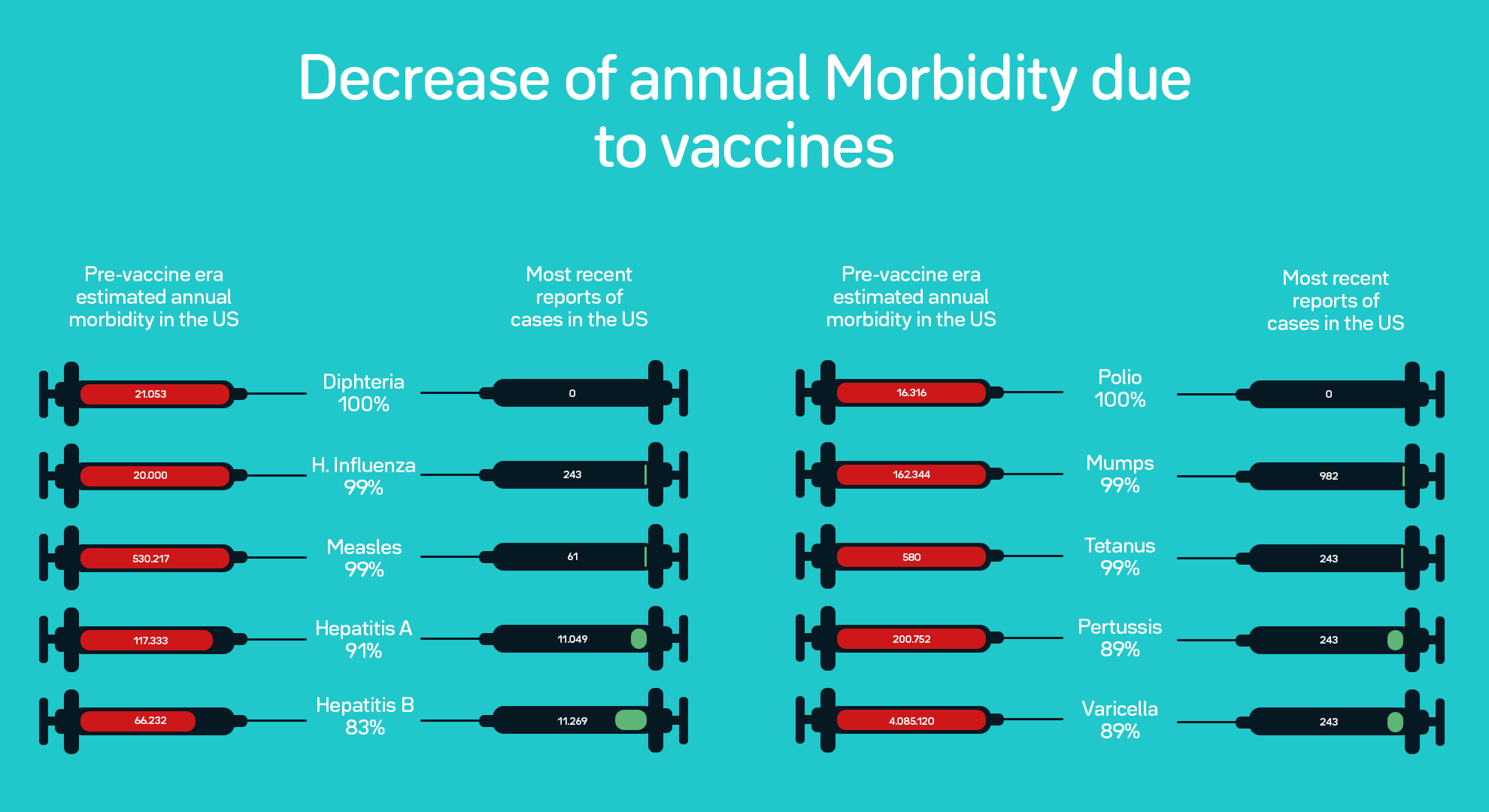The history of vaccination began in 1796 with the English scientist Edward Jenner. He discovered the smallpox vaccine, which is known as the first successful vaccine ever developed. Since then, more and more vaccines have been discovered. Today there are 26 available vaccines recognized by the World Health Organization (WHO). Another 24 vaccines are so-called pipeline vaccines, which are still undergoing clinical trials for diseases such as HIV-1, Malaria or Tuberculosis.
No matter how hard scientists, doctors and politicians try, pseudo-science will always catch peoples’ attention. Especially in European countries, the rate of people who don’t believe in vaccination is dangerously high. A study from 2016 shows, that 41 percent of the population in France doubt the usefulness of vaccination, being the most skeptical people within the study. In average 12 percent of all people who took part in the study doubted the actual use of vaccinations. In Germany, 10.5 percent of the people are in doubt.
Measles could be exterminated if a vaccination quote of 95 percent for the second vaccination was met for children. – Health in Germany, published by Robert Koch Institut and Destatis in 2015.
This led to a curious event during the 2016 summer Olympics in Rio, Brazil. The WHO sent a health warning statement: People traveling to Brazil should make sure they are vaccinated against measles and rubella (MMR). Not because Europeans could get infected with these two serious diseases in South America. In contrast, measles and rubella are exterminated in Brazil. The WHO warning was sent to make sure it stays this way and the Europeans don’t bring the diseases back.
The need for laws to fight diseases
Since several years, experts and health politicians are asking for law in Germany to make vaccination for measles an obligation. German health minister Jens Spahn (CDU) handed in his law proposal at the beginning of May 2019. This suggests, that parents who don’t vaccinate their children are not allowed to bring their kids in a public day-care center. In addition, they may have to pay a penalty of up to 2.500 Euros.
Why is it even necessary to force parents to vaccinate their children and better their health as well as the health of the public? Well, certain groups of skeptics turn to pseudo-scientific studies, conspiracy theories and country sayings in order to prove vaccination as a fraud. They spread their beliefs in social media, blogs and controversial media outlets, infecting others with their destructive way of thinking. The following article looks at the arguments made by vaccination skeptics.
#1 Nature makes the child stronger than anything else!
It’s true that catching a disease and getting sick, which is what natural immunity means, results in a stronger immunity to disease than a vaccination would offer. But the dangers are simply far too great to outweigh the relative benefits. For instance, a child could very well acquire immunity to measles by contracting the disease, but in doing so risks a 1 in 500 chance of death. In contrast, the chance of developing a severe allergic reaction to an MMR vaccine is less than one in a million.
Sometimes parents argue, their child has developed rapidly after going through the infectious disease. They think it’s important for the child’s development to overcome a disease. Their conclusion: A vaccination will delay the kid’s development.
The truth is, there is no scientific evidence for any correlation between vaccination and the child’s mental or body development. Also, the most common vaccinations are against twelve frequent diseases. The child’s immune system still must face hundreds of other germs and viruses each day. In addition, the vaccination process itself is stimulating the immune system being part of the developing baby brain and body.
#2 Vaccines are toxic chemical cocktails!

Yes, vaccines contain potentially toxic substances like aluminum and formaldehyde. Here comes the adage “The dose makes the poison” into play. For instance, common salt is essential for normal body function. At the same time, in larger amounts it’s harmful.
The chemical components of vaccines are in such a low dose, they have no harm at all. All the ingredients serve a purpose. Formaldehyde is used to kill vaccination viruses. Aluminum makes the body’s immune reaction stronger and phenol is used to make the vaccine last longer.
Mercury was accounted to be the reason for a rise in autism diagnoses. The WHO, the US “Institute for Medicine” as well as the European drug admission all independently came to the result, that there was never any connection between mercury used in vaccinations and autism. Nevertheless, since 2001 mercury is not used for vaccinations anymore due to public outrage.
#3 Hygiene and food did the job, not vaccines!

No doubt: hygiene, nutrition and wealth are important elements in the fight against infectious diseases. For example, clean water and well-working hand hygiene are essential to prevent hepatitis a, typhus or cholera. Other diseases, such as measles, hepatitis b or polioviruses are spread from human to human by sexual contact or simply by coughing.
In South and North America, measles is exterminated, since 2015 rubella is also exterminated. This is due to consequent vaccination programs. In other parts of the world, especially countries south of the Sahara, India and Southeast Asia, measles is a common cause of death. In 2014 about 115.000 children died of measles. Still, the WHO states that because of vaccination more than 21 million deaths were prevented since the year 2000.
#4 Pharma companies only want our money!
As all private companies, pharma companies have a legitimate right to make money with the products they sell. But saying vaccination is a highly profitable market for pharmaceutical companies is simply wrong.
In fact, the prices for the treatment of measles is significantly higher than the price paid for the vaccination. In the US, the MMR vaccination costs 21,22 Dollars. The average price for a measles treatment including hospitalization, researched by the Center for Disease Control and Prevention, can cost up to 46.060 Dollars.
In Germany, the vaccine MMR Priorix, for example, costs 51 Euro while the average treatment for measles in a hospital costs 520 Euro.
Letting the numbers speak for themselves, public health insurance in Germany paid a total of 194 billion Euro in 2014 for healthcare. About 17 percent (33 billion Euros) was spent on drugs. The comparably small amount of 1 billion Euros (0.65 percent) was spent on vaccines. Big pharma companies have their debatable ways of making money, but vaccines are not part of it.
Also, several pharma companies give up on vaccine research and production because it’s hardly paying off. Other medications, especially for chronical diseases, must be taken by the patient every day. The lifelong prescription of a drug is way more beneficial to the company than the once in a lifetime vaccination. In conclusion, pharma companies would earn way more money if people stop vaccinating, get dangerously sick as a child and they are depending on medications for the rest of their life’s.
#5 This is MY choice, not yours!
Yes, the free will concerning someone’s health, or someone’s children health lies within their own choices. Talking about vaccines, it’s a common misconception. Vaccines are made to not only protect the person who gets the injection, but to protect everyone else, too. Especially, vulnerable groups like the elderly or people who can’t be vaccinated because of medical issues.
As said before, exterminating a disease needs the participation of at least 95 percent of the population. Deciding against vaccinations means putting others at risk.
#6 Does this sh*t even work?!

By law, every vaccine only gets admission if it is scientifically proven that it is valid and not harmful. The evidence must be delivered in clinical trials done by the pharma company. Also, these pieces of evidence get investigated by the EU and other institutions within EU countries. While a vaccine is at use, several independent researchers are testing the drug for its effectiveness and possible side effects.
Examples show the considerable impact vaccinations already had. In Germany, at the beginning of the 1960s, a vaccine against infantile paralysis was introduced. 1961 about 4.700 children got sick with infantile paralysis. Only four years later, after the vaccine was in use, less than 50 cases of the same disease were reported. Since 1990 Germany is free of poliomyelitis.
Something similar happened with the bacteria Hemophilus influenzae, which causes severe brain fever. Before 1990, around 100 to 120 cases of meningitis caused by the bacteria were reported in eastern Germany. After the vaccination was introduced in 1990, the number of infections was quickly reduced to less than ten a year.
It shouldn’t be the duty of the children to unwillingly sacrifice their health and putting others around them in danger. Healthcare is developing fast, and the cruelty which was caused by diseases decades ago seems to be forgotten. But just because a disease is not common anymore doesn’t make it less dangerous.
As an innovative company, Tec4med is not looking back to 1796. We are heading towards the future. We’re developing the NelumBox and empowering medical staff around the world to bring vaccines through the heat of a desert or the humidity of the jungle, saving lives. Because most vaccines are cold chain drugs, which need to be stored and transported at +2°C to +8°C, specific areas around the globe are still in need of better healthcare infrastructure. For further information feel free to send us an e-mail to info(at)tec4med.com
